Submitted:
31 January 2024
Posted:
01 February 2024
You are already at the latest version
Abstract
Keywords:
1. Introduction
1.1. General Background of the Study
1.2. Objective of the Study
- To evaluate existing landfill suitability of practicing proper solid waste management.
- To assess well known solid waste types which are taken for final disposal by households to landfill site.
- To investigate the current status and practice of solid waste management.
1.3. Research Questions
1.4. Significance of the Study
1.5. Scope of the Study
2. Review of Literature
2.1. Theoretical and conceptual definition of solid waste Management
2.2. Theoretical Review
- 1)
- Waste generation: Waste generation refers to activities in which resources are identified as no longer valuable and are either discarded or gathered for disposal.
- 2)
- Waste handling and separation, storage, and processing at the source: Waste handling and separation are the operations related with the management of waste until it is placed in a storage container for collection. Handling also includes transporting loaded containers to the place of pickup. Waste component separation is a key stage in the treatment and storage of solid waste at the source.
- 3)
- Collection: The functional part of collection involves not only the collection of solid waste and recyclable products, but also the conveyance of these materials to the area where the collection vehicle is emptied after collection. This site could be a material processing facility, a transfer station, or a landfill.
- 4)
- Solid waste separation, processing, and transformation: New methods and facilities for recovering waste materials separated at the source include curbside pickup, drop-off, and buy-back centers. Separation and processing of wastes segregated at the source, as well as separation of commingled wastes, typically take place in materials recovery facilities, transfer stations, combustion facilities, and disposal sites.
- 5)
- Transfer and transportation: This aspect consists of two steps: 1) moving garbage from the smaller collection vehicle to the larger transport equipment 2) the following transportation of wastes, typically across large distances, to a processing or disposal facility.
- 6)
- Disposal: Today, the ultimate fate of all solid wastes is landfilling or land spreading, whether they are residential wastes collected and transported directly to a landfill site, residual materials from materials recovery facilities (MRFs), residue from solid waste combustion, compost, or other substances [17].
2.2.1. Significance of definition of Evolving Theory
2.2.2. Moving toward the waste management Theory
- ➢
- Giving conceptual responses by describing waste and concepts.
- ➢
- Providing guidance for selecting garbage disposal choices.
- ➢
- Providing a foundation for selecting and integrating waste management strategies.
- ➢
- Forecasting the results of waste management actions.
- ➢
- Aiding legislation in prescribing waste-related action.
2.3. Approaches of Solid Waste Management
2.3.1. Convectional Approaches to Planning for Solid Waste Management of Urban Environment
2.3.2. Alternative Approaches to Planning of SWM of the Urban Environment
2.4. Empirical Review
2.4.1. The Global Solid Waste Management Perspective
2.4.2. Status of Solid Waste Management in Ethiopia
2.5. Summary Implication of Reviews
2.6. Conceptual Framework of the Study
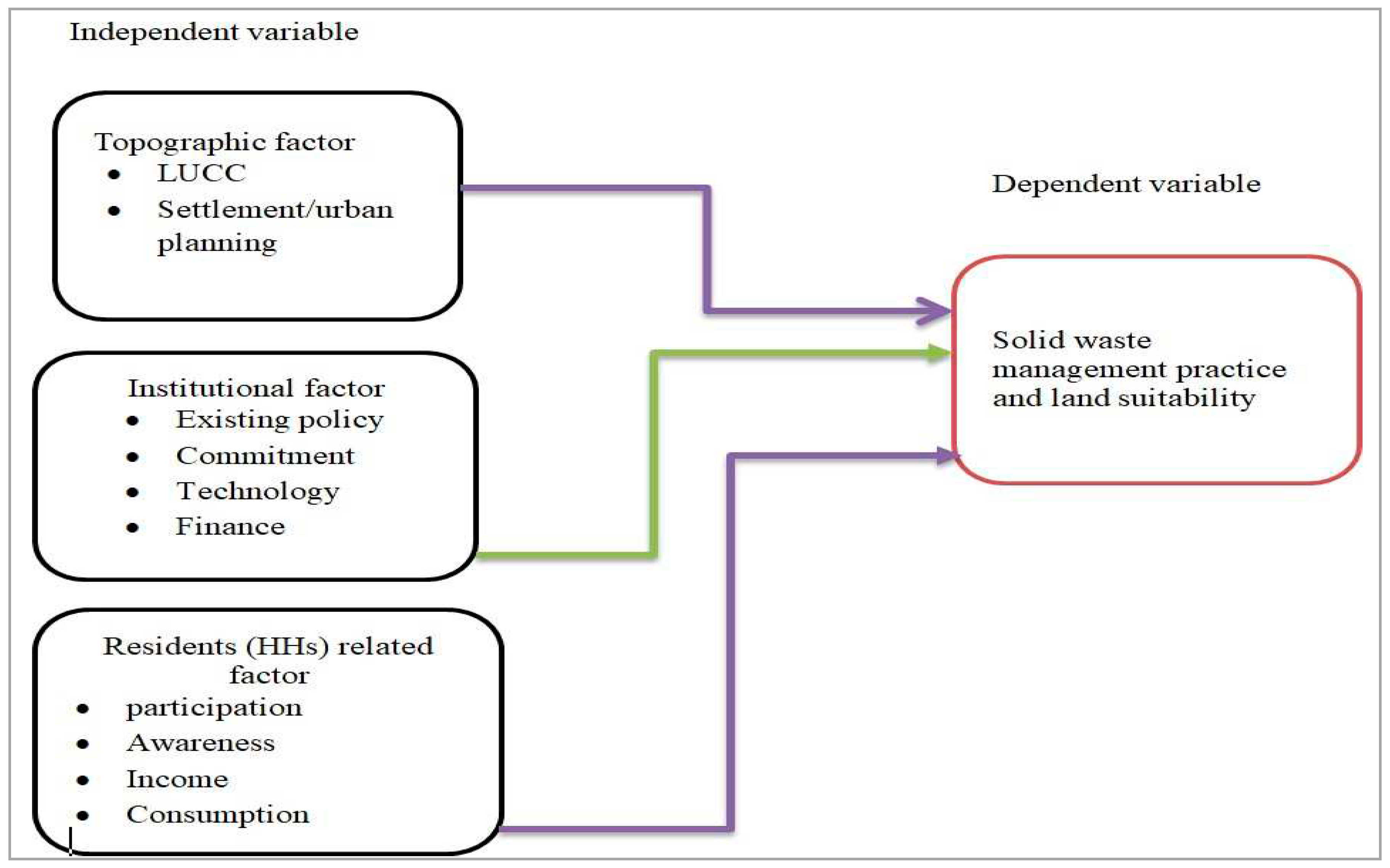
3. Research Methodology
3.1. Study Area Description
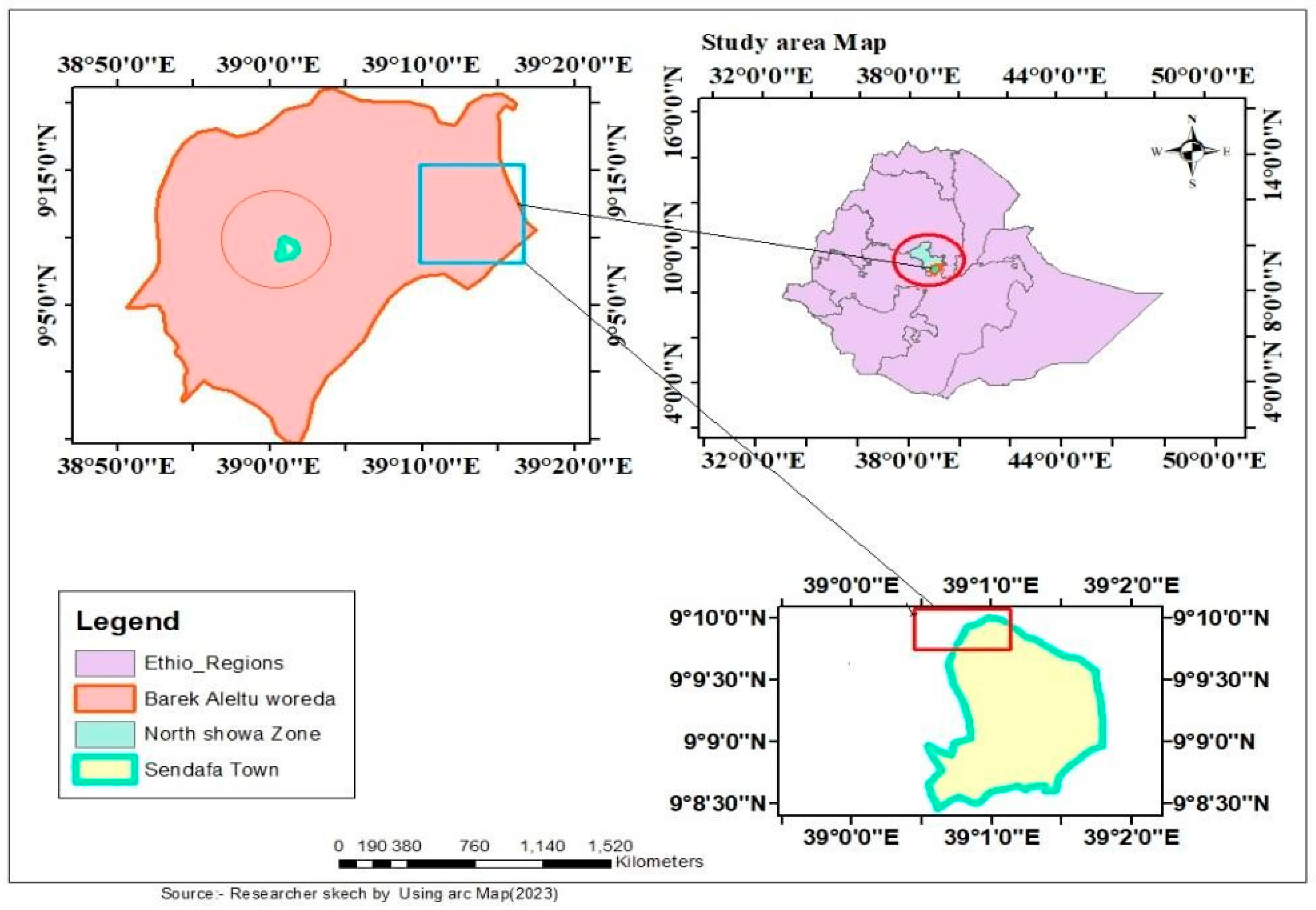
3.2. Research Design
3.3. Research Approach
3.4. Population of the Study Area
3.5. Sampling Methods and Sampling Frame Work
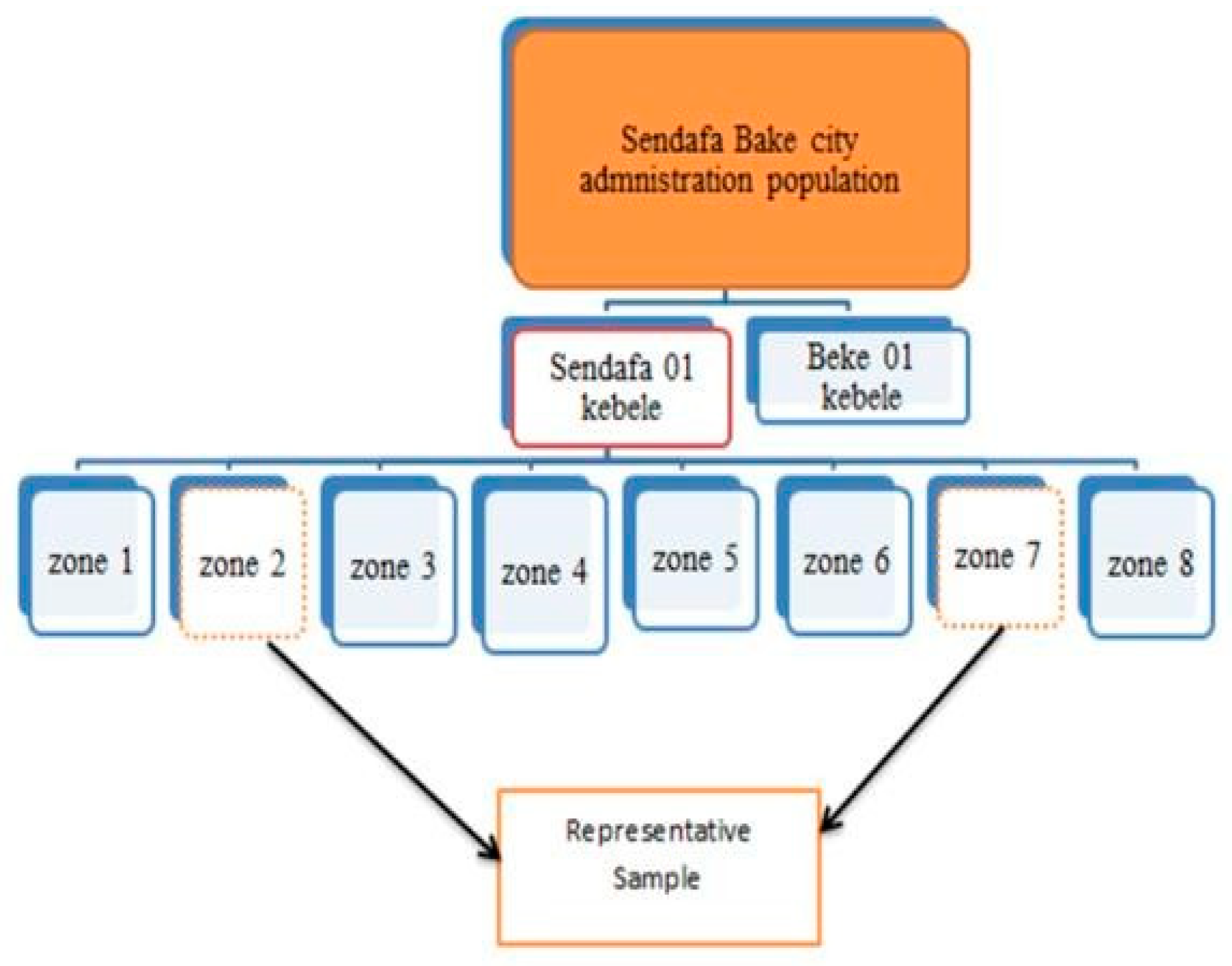
3.6. Sources of Data and Data Collection Method
3.6.1. Sources of Data
3.6.2. Data Collection Methods
3.7. Methods of Data Analysis
3.7.1. Landfills Suitability Analysis by Using GIS
3.7.2. Model Specification
3.8. Variable Description
3.9. Validity and Reliability
3.10. Ethical Consideration
4. Results and Discussion
4.1. Response Rate
4.2. Demographic Information of Respondents
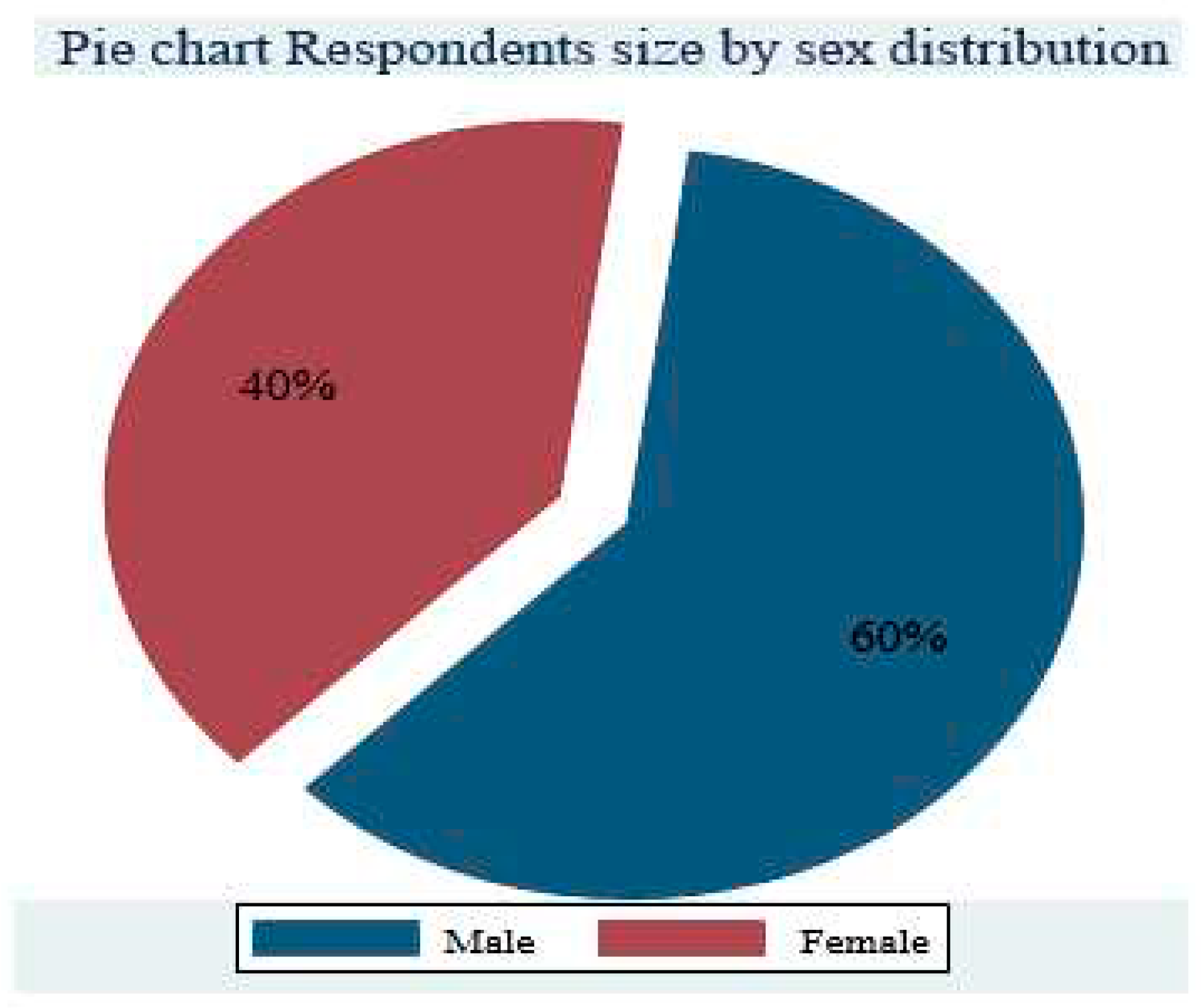
4.2.1. Respondents Family Size
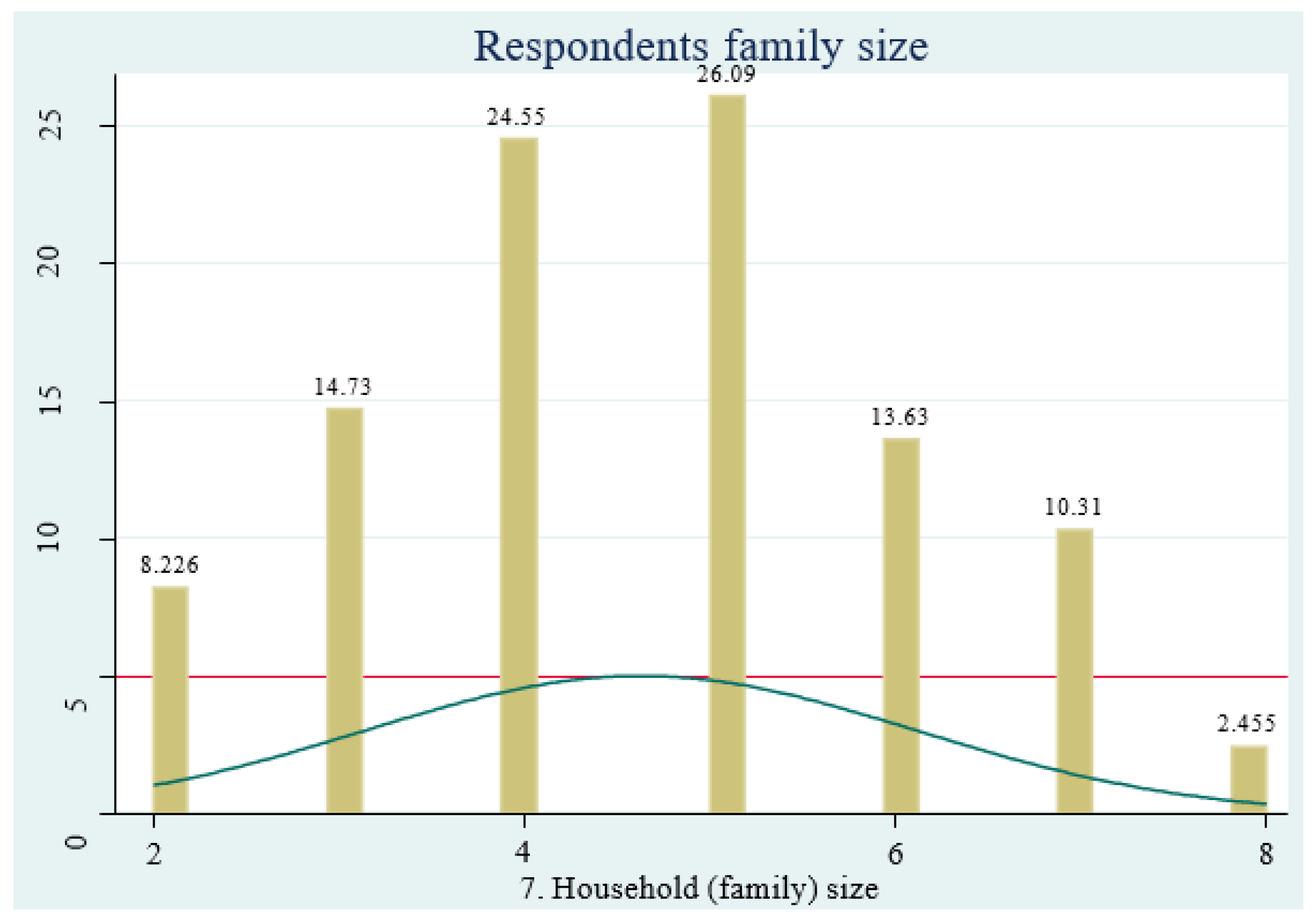
4.2.2. Respondents Response on HHs Solid Waste Service Payment Has Relation with Income
| solid waste payment and Income |
Freq. |
Percent |
Cum. |
|---|---|---|---|
| yes | 154 | 38.69 | 38.69 |
| No | 244 | 61.31 | 100.00 |
| Total | 398 | 100.00 |
4.2.3. Status of Solid Waste Management and Housing Ownership
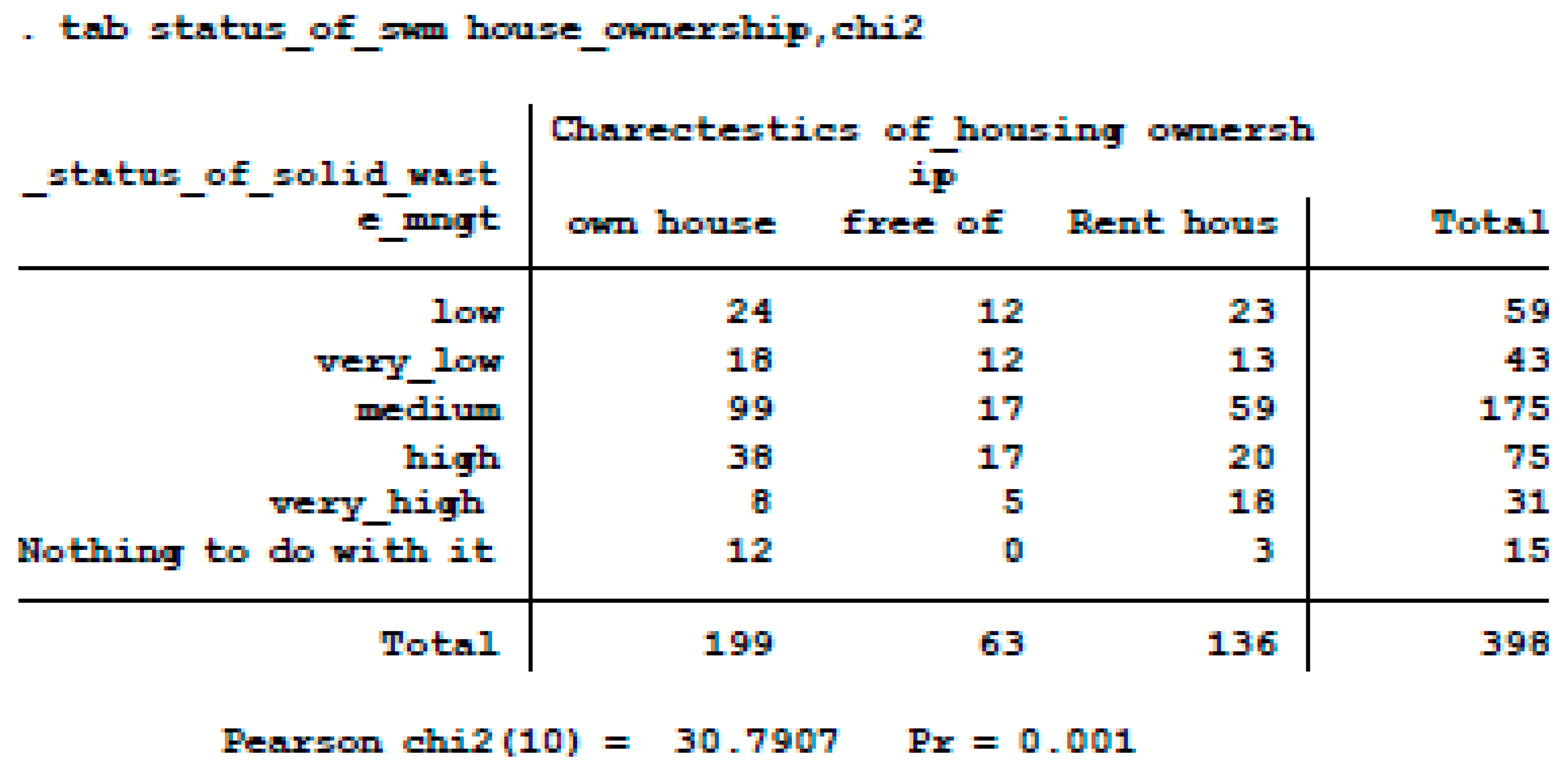
4.2.4. Respondent’s Response on Landfills Site Suitability
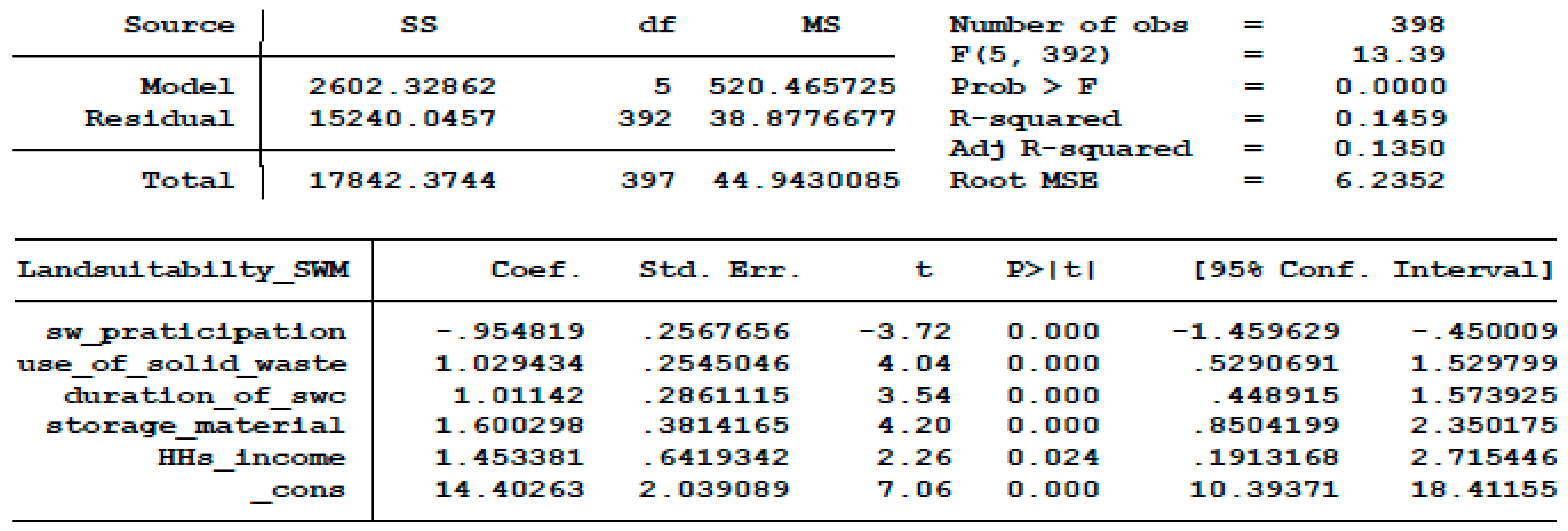
4.2.5. Respondents Response on Status of Solid Waste Management
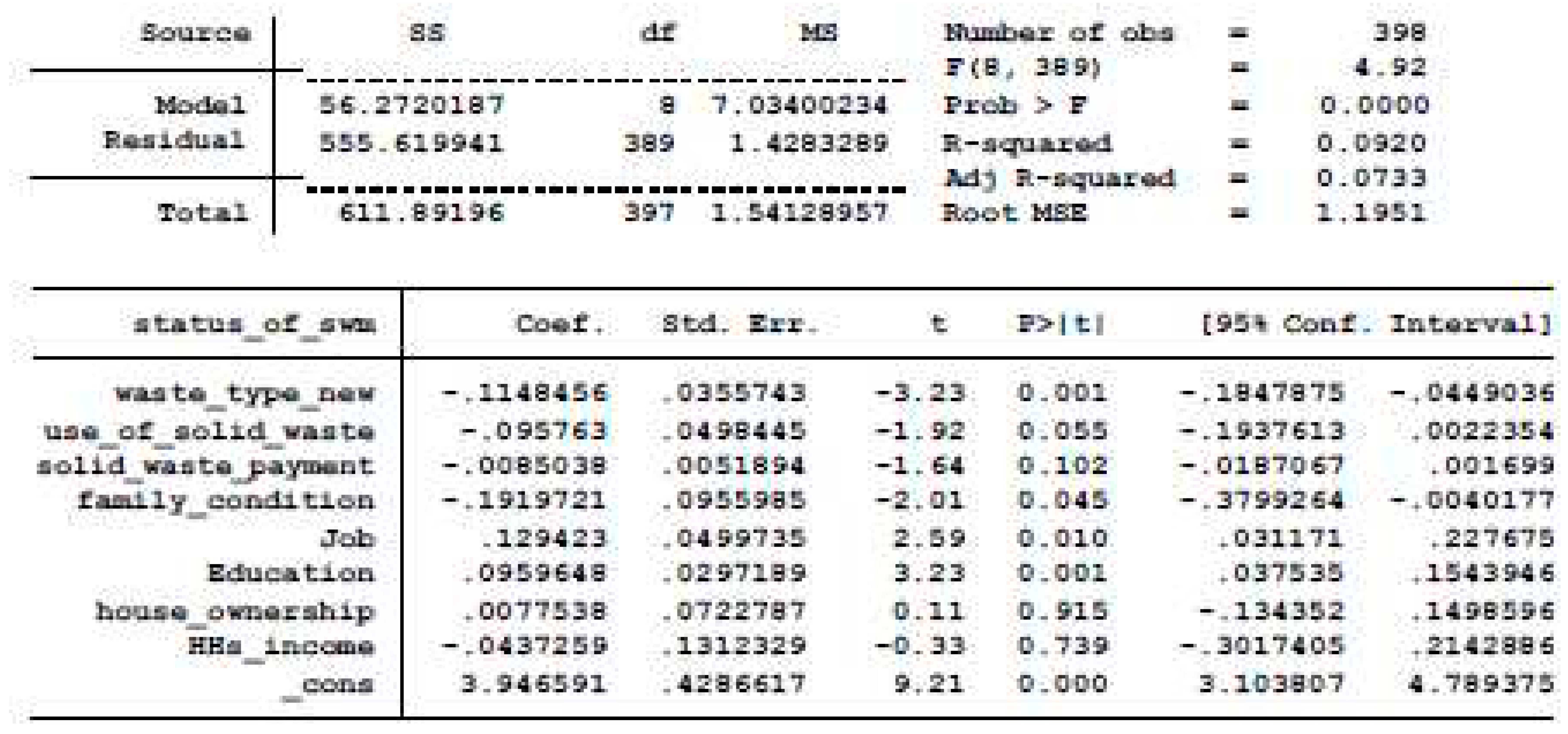
4.2.6. Respondents Response on Household’s Income and Determinant Factors
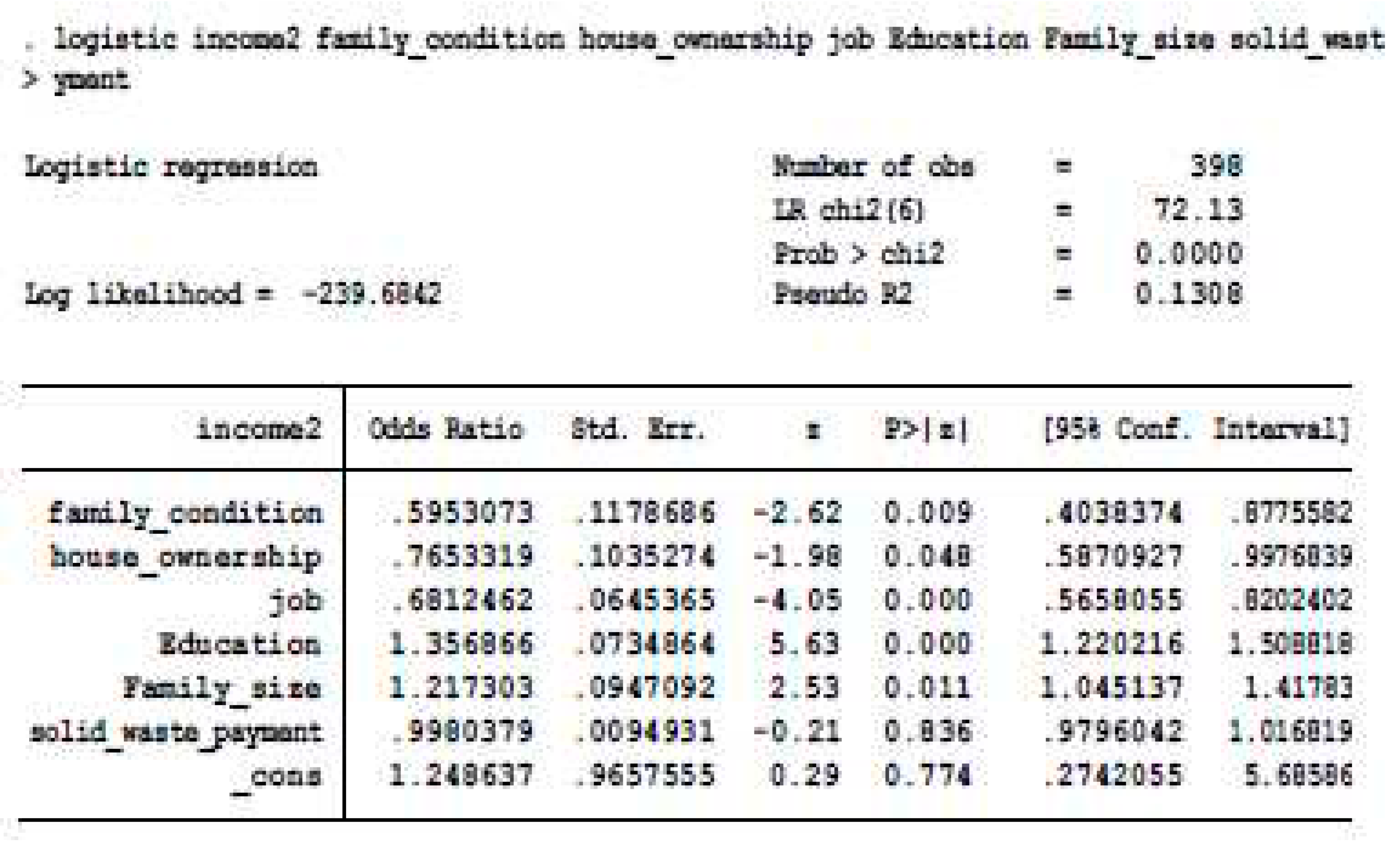
4.2.7. Respondents Response on Types of Solid Waste and Solid Waste Storage Material
| solid waste type by nature |
Freq. |
Percent |
Cum. |
|---|---|---|---|
| recyclable Biodegradable Nondegradable |
66 261 71 |
16.58 65.58 17.84 |
16.58 82.16 100.00 |
| Total | 398 | 100.00 |
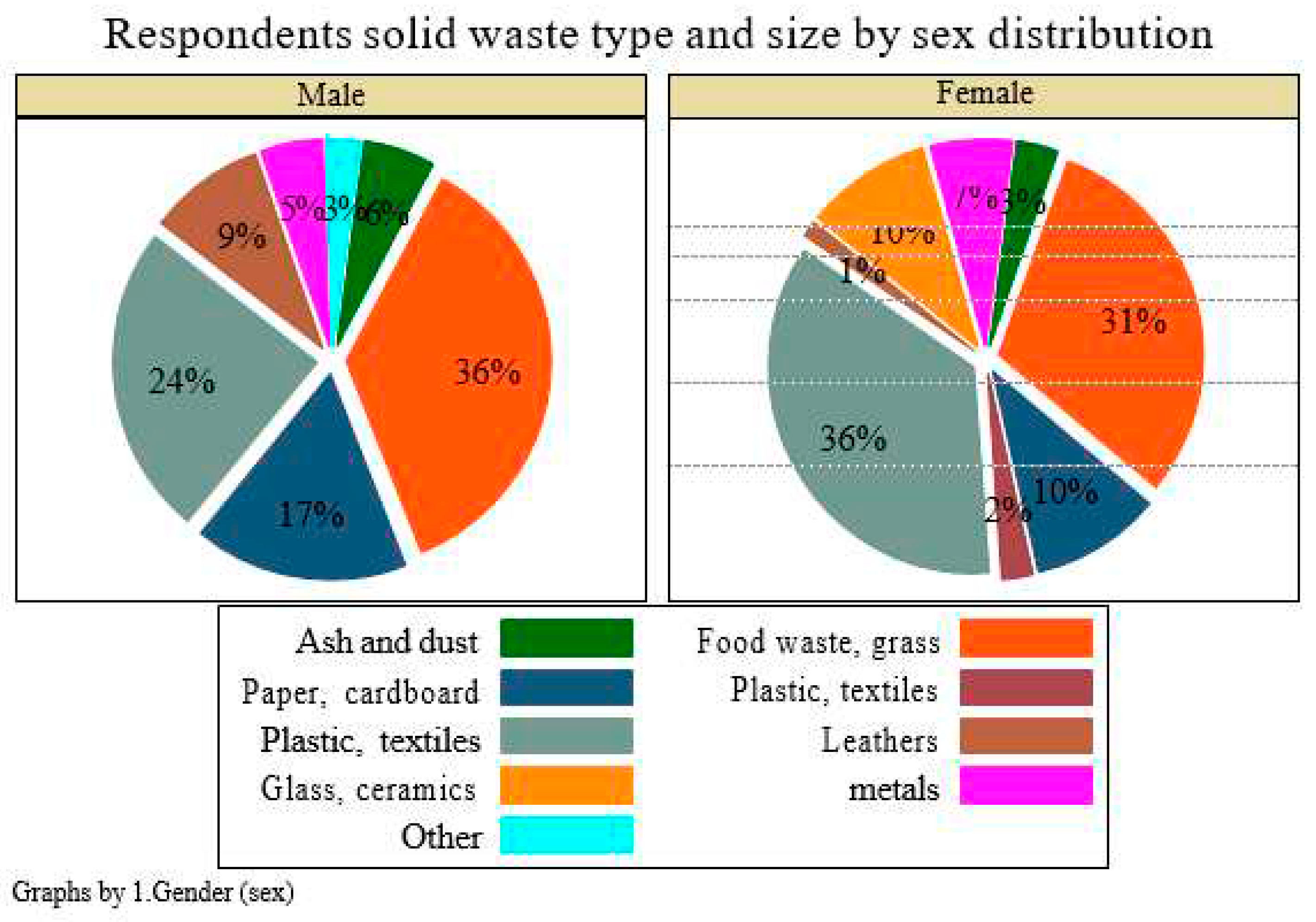
| Variable | Obs | Mean | Std. Dev. | Min | Max |
|---|---|---|---|---|---|
| solid_wast~t | 398 | 25.42462 | 23.58709 | 1 | 100 |
| Storage_material | Freq. | Percent | Cum. |
|---|---|---|---|
|
Use Bin Use carton Use plastic container Use plastic bag Use old tin oppen space other |
1 19 54 284 22 8 10 |
0.25 4.77 13.57 71.36 5.53 2.01 2.51 |
0.25 5.03 18.59 89.95 95.48 97.49 100.00 |
| Total | 398 | 100.00 |
4.2.8. Respondents Response on Why Households Are Practicing Improper Solid Waste Management
| Reasons_for_improper_solid _waste_management |
Freq. |
Percent |
Cum. |
|---|---|---|---|
|
Distance of Road Low level of Income waste collectors schedule Transportation problem Low level of Awerness Other related factors |
31 65 53 93 138 18 |
7.79 16.33 13.32 23.37 34.67 4.52 |
7.79 24.12 37.44 60.80 95.48 100.00 |
| Total | 398 | 100.00 |
4.3. Qualitative Data Analysis
4.3.1. Respondent’s Response on Attitude of Communities towards on Proper Solid Waste
4.3.2. Respondent’s Response on Existing Landfill Suitability for Collection of Solid Waste
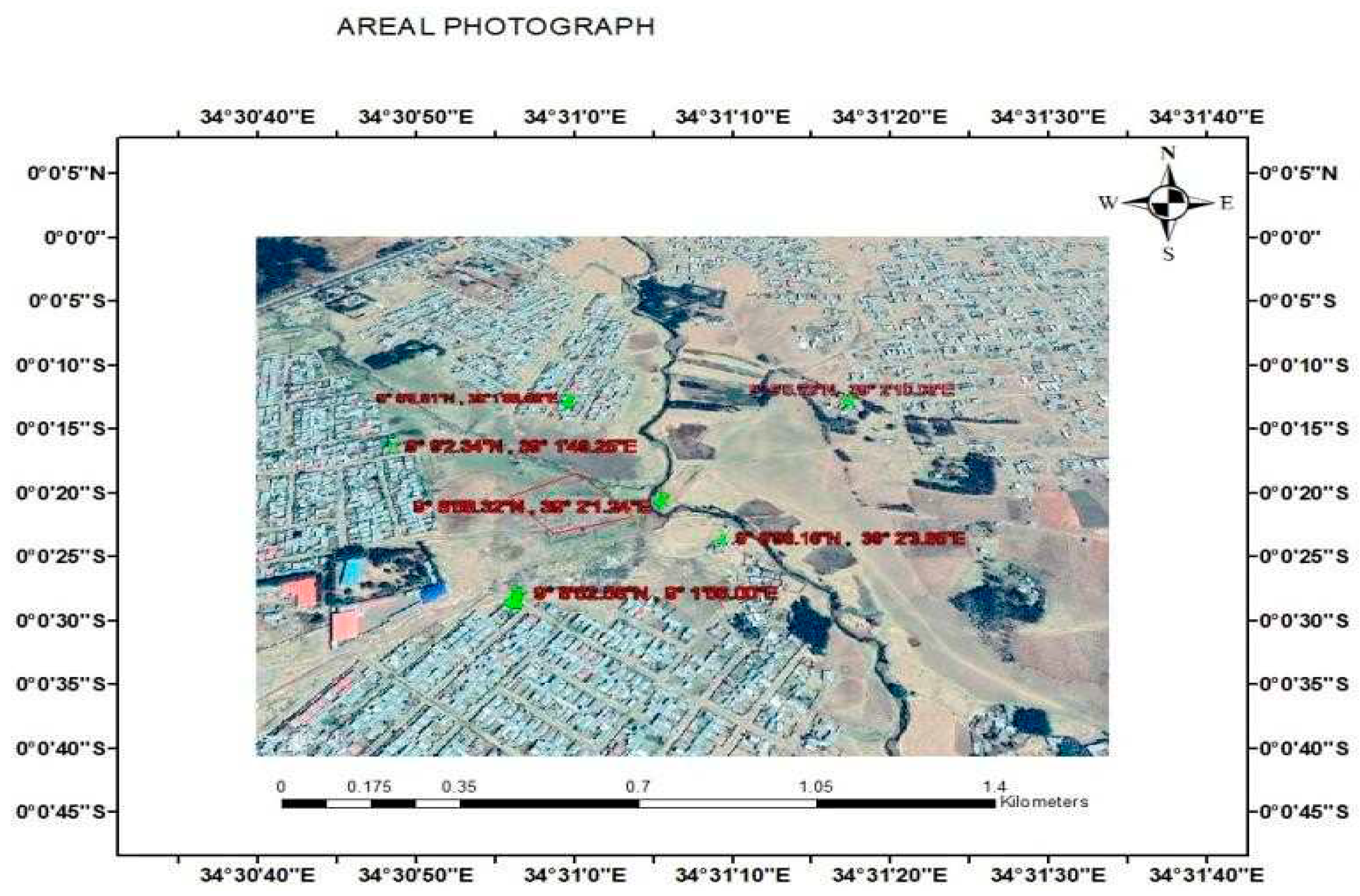
4.3.3. Respondent’s Response on Types of Waste Particle That Most of the Time Used to Landfill Site
4.3.4. Respondents response on whether urban community has their own solid waste container or bin around their home
4.3.5. Respondents Response on Household’s Method of Solid Waste Management Practice
4.3.6. GIS Arc Map Generated Study Are Watershed and Soil Type.
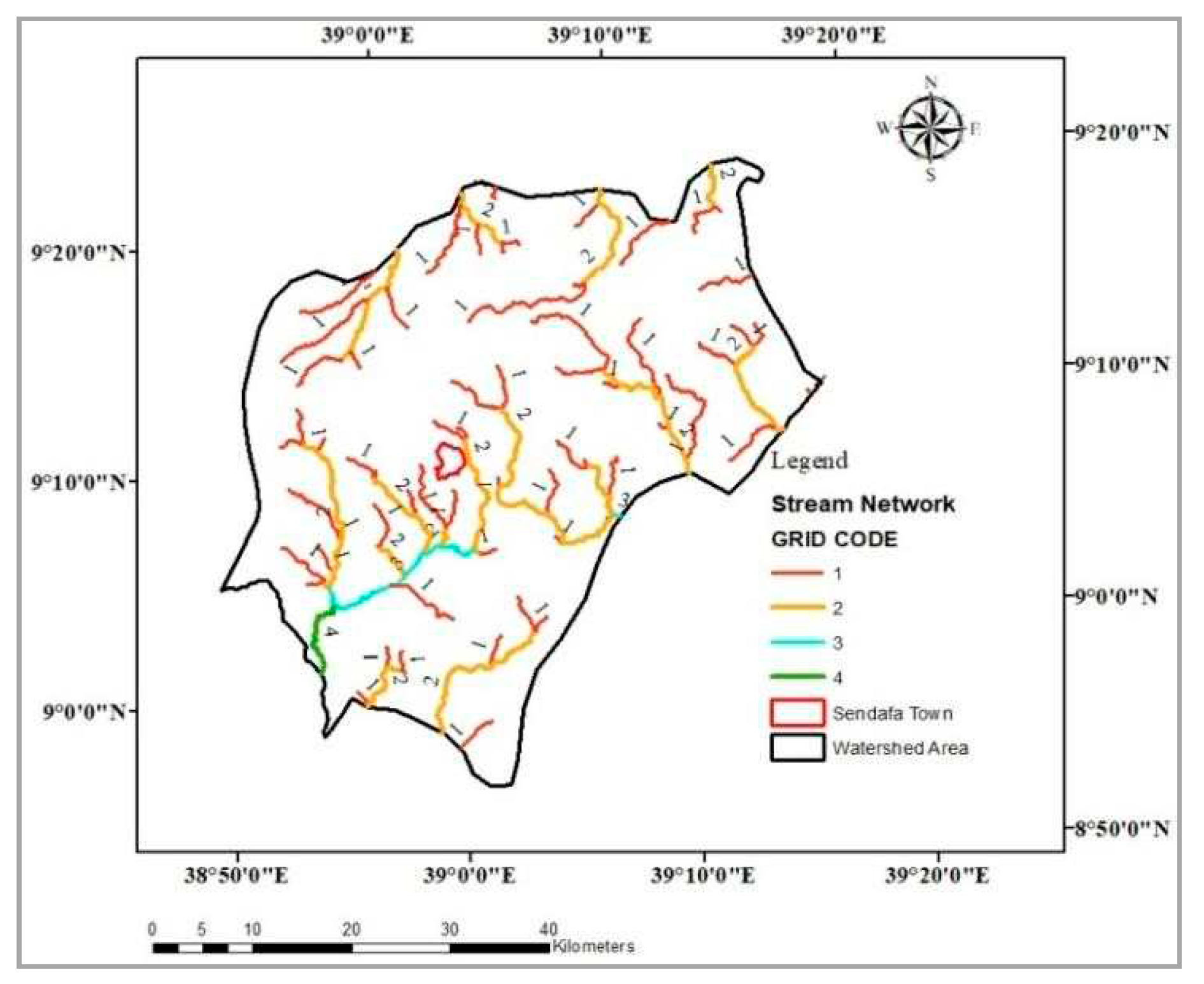
4.3.7. Soil Type of Study Area by Arc Map GIS
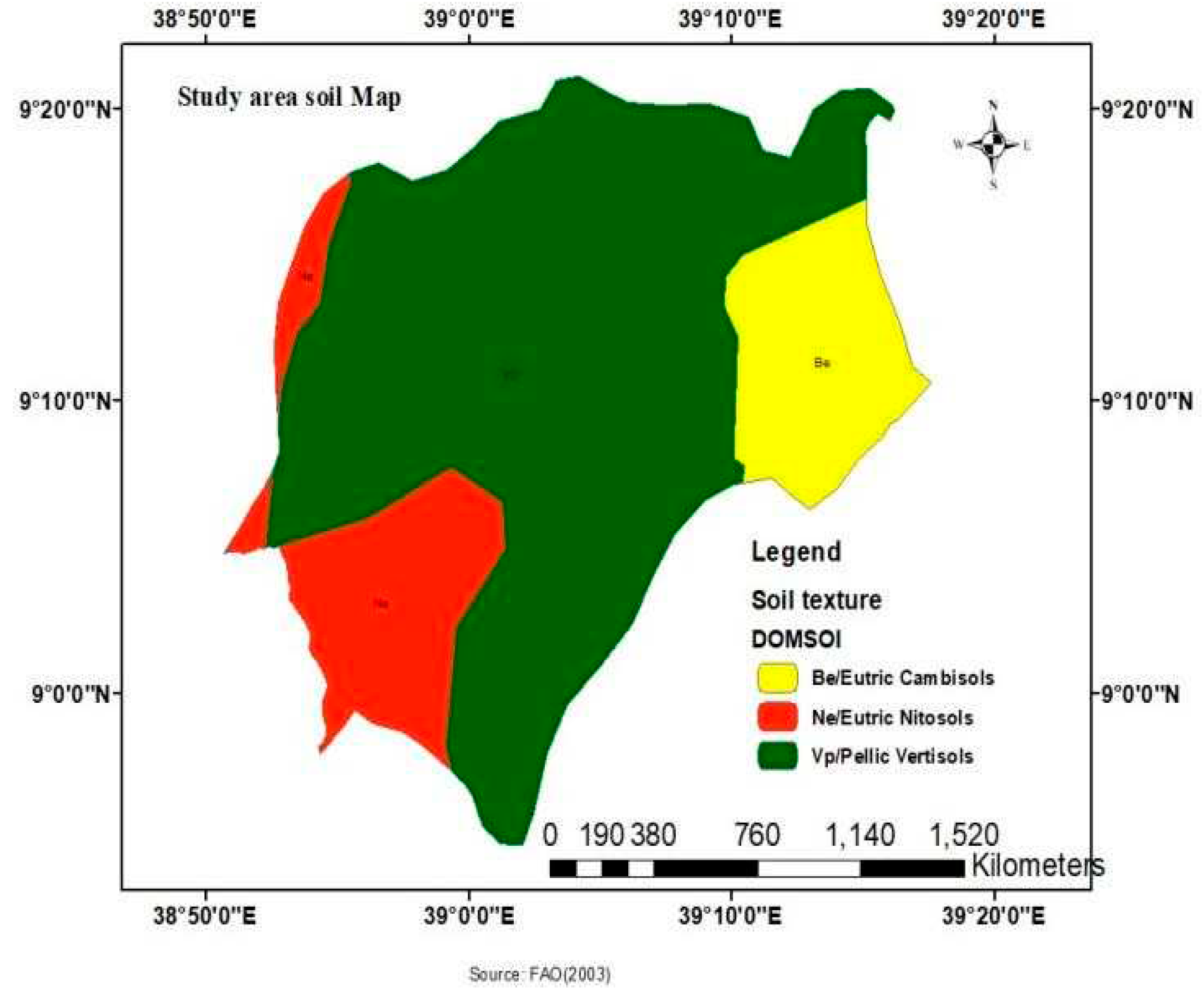
4.4. LUCC of Study Area
| No | Land use type | Areal coverage sq. mile |
|---|---|---|
| 1 | Agricultural Land | 0.503516 |
| 2 | Degraded Land | 0.200503 |
| 3 | Settlement | 0.960468 |
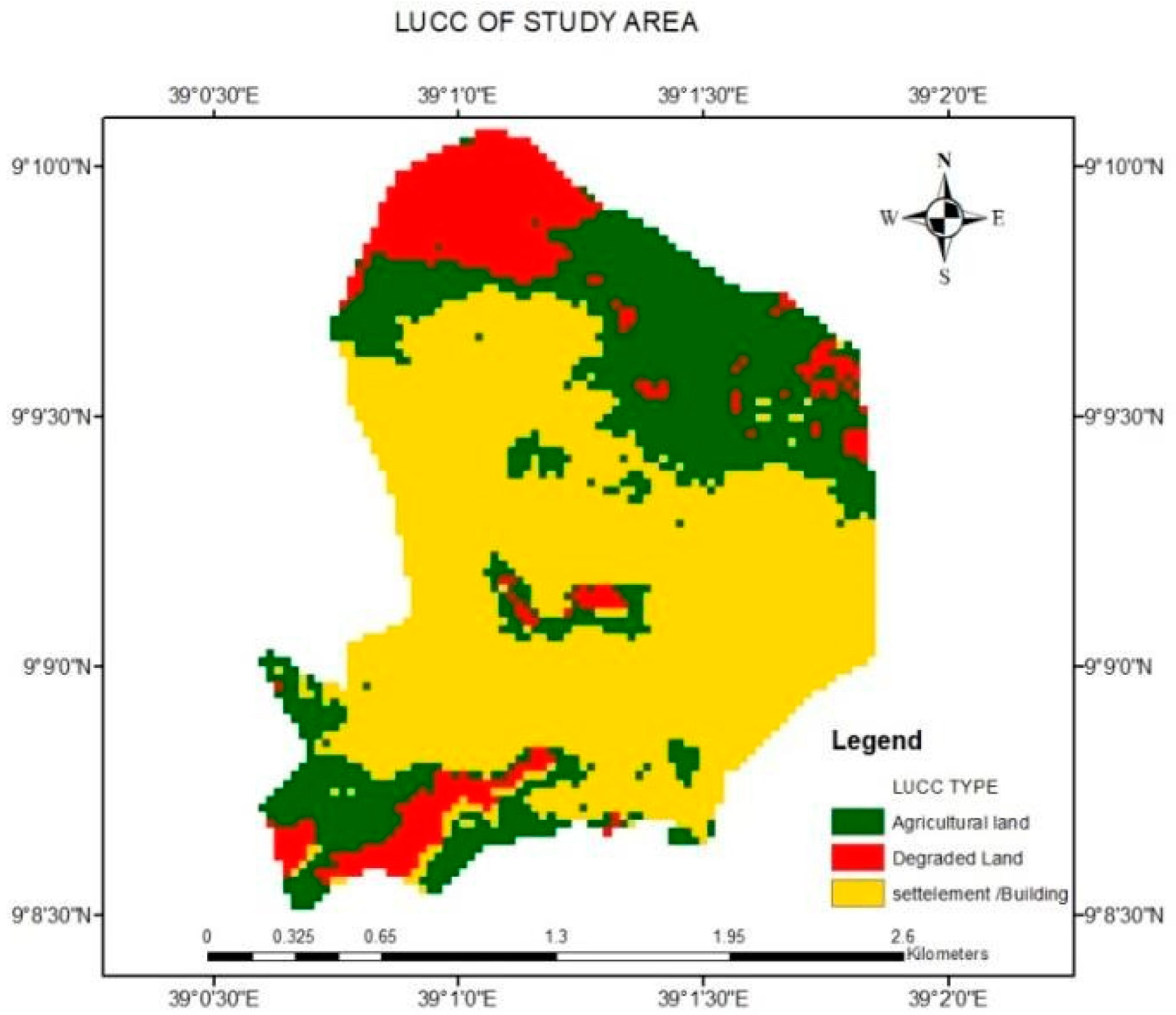
5. Conclusion and Recommendation
5.1. Conclusion
5.2. Recommendation Based on Research Findings
Acknowledgments
Conflicts of Interest
List of Abbreviations
References
- Abebaw and ayenew. (2005). Demand for improved solid waste service in Jimma Town, Ethiopia : Evidence From Household survey Data.
- Birkie, A., Addisu, S., & Mekuriaw, A. (2020). Solid waste management practice and dumpsite suitability analysis using GIS technology in Debre Markos town, Ethiopia. Ethiopian Journal of Science and Technology, 13(2), 115–130. [CrossRef]
- Helelo, Ab; Senbeta, Af; Anshebo, S. (2019). Assessment of Solid Waste Management ( SWM ) Practices in Hawassa University.
- C. R. kothari. (2004). Research Methodology : Methods and techniques(second revision). New age international publisher.
- Ching, K., Wang, M., Lee, K. E., & Mokhtar, M. (2021). Solid Waste Management in Small Tourism Islands : An Evolutionary Governance Approach.
- Debrah, V. and D. (2021). Raising Awareness on Solid Waste Management through Formal Education for Sustainability : A Developing Countries.
- Gorfnesh, Million, & Amade and Gizachew. (2019). Assessment of status of solid waste management in Asella town, Ethiopia.
- Massoud, M. A., Mokbel, M., Alawieh, S., & Yassin, N. (2020). Towards improved governance for sustainable solid waste management in Lebanon : Centralised vs decentralised approaches. [CrossRef]
- Medina-salas, L. De, Castillo-gonzález, E., Giraldi-díaz, M. R., & Jamed-boza, L. O. (2019). Valorisation of the organic fraction of municipal solid waste. [CrossRef]
- Mtey, J. K. (2005). Project proposal for solid waste collection : Kawe Community Development Trust.
- Põldnurk, J. (2015). Optimization of the economic, environmental and administrative efficiency of the municipal waste management model in rural areas. Resources, Conservation and Recycling, 97, 55–65. [CrossRef]
- Singh, A. (2021). Basic Steps of Doing Research. September. [CrossRef]
- Sultan, S. (2017). Solid Waste Management in Urban India : An Overview. 5(4), 61–69. [CrossRef]
- Grömping, U. (2016). Practical Guide to Logistic Regression. In Journal of Statistical Software (Vol. 71, Issue Book Review 3).
- Pongrácz, E., Phillips, P. S., & Keiski, R. L. (2004). Evolving the theory of waste management: Defining key concepts. Waste Management and the Environment II, 471–480.
- Ross, S. M. (2017). Linear Regression. Introductory Statistics, 519–584. [CrossRef]
- Girly Lagbas -Aranas, A. U. (2015). The Theoritical Underpinnings of The Solid Waste Management Practices: A Proposed Blueprint Towards Government Action. European Scientific Journal, 11(23),1857–7881.
- Esayas (2019). The effect of selected human resource management practices on employee’s turnover intention: the case of civil employees of Ethiopian federal police commission: A Thesis Submitted to Addis Ababa University School of Commerce Graduate Studies Program.
Disclaimer/Publisher’s Note: The statements, opinions and data contained in all publications are solely those of the individual author(s) and contributor(s) and not of MDPI and/or the editor(s). MDPI and/or the editor(s) disclaim responsibility for any injury to people or property resulting from any ideas, methods, instructions or products referred to in the content. |
© 2024 by the authors. Licensee MDPI, Basel, Switzerland. This article is an open access article distributed under the terms and conditions of the Creative Commons Attribution (CC BY) license (http://creativecommons.org/licenses/by/4.0/).




